Unit 6 An old man tried to move the mountains Section A 3a-3c课件 (共30张PPT,含内嵌视频)人教版英语八年级下册
文档属性
| 名称 | Unit 6 An old man tried to move the mountains Section A 3a-3c课件 (共30张PPT,含内嵌视频)人教版英语八年级下册 | 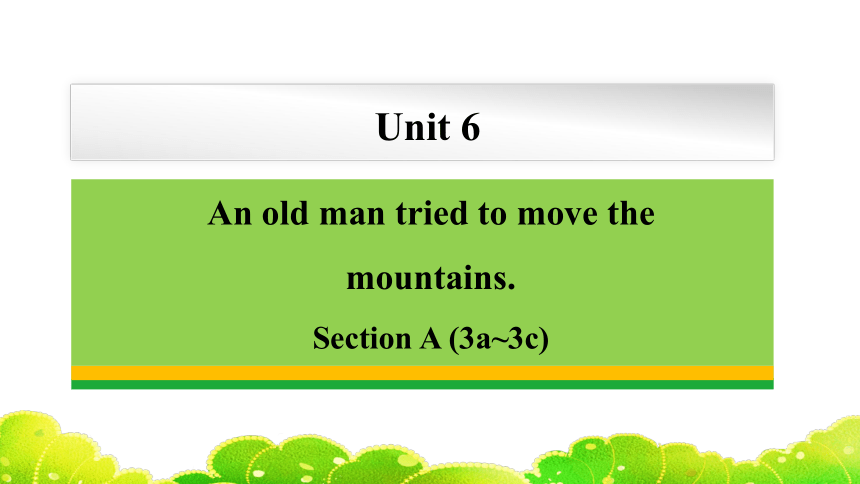 | |
| 格式 | pptx | ||
| 文件大小 | 37.0MB | ||
| 资源类型 | 教案 | ||
| 版本资源 | 人教新目标(Go for it)版 | ||
| 科目 | 英语 | ||
| 更新时间 | 2024-01-01 21:49:02 | ||
图片预览

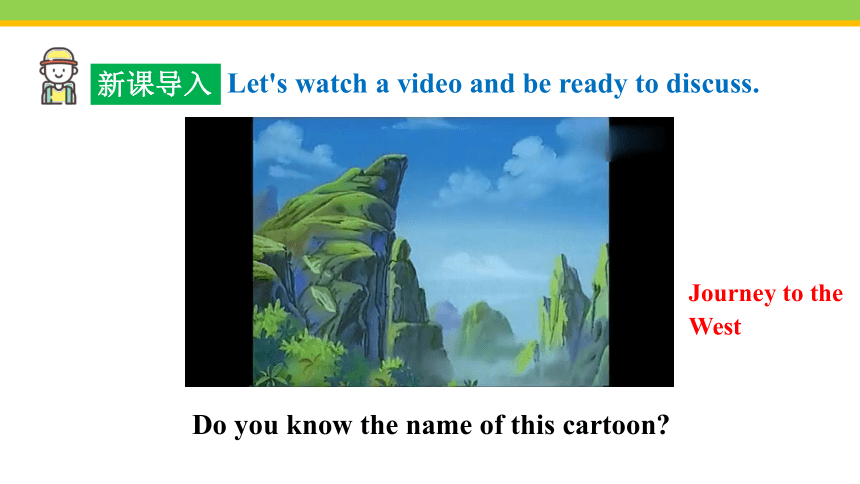
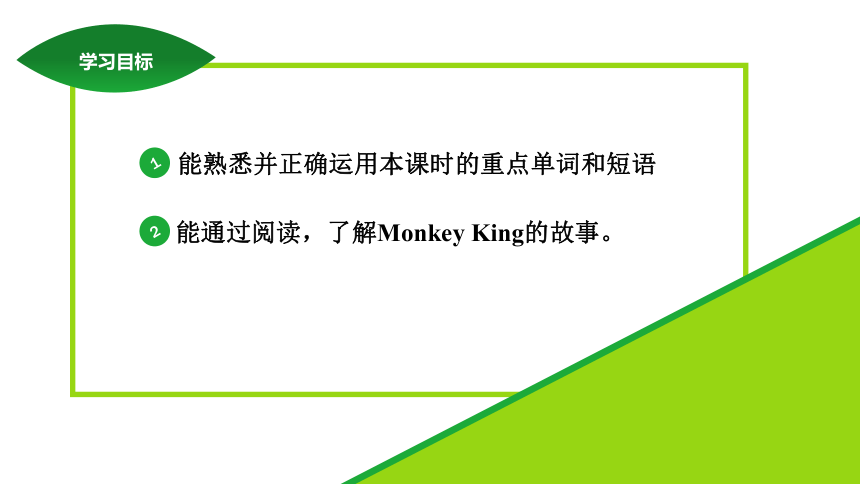
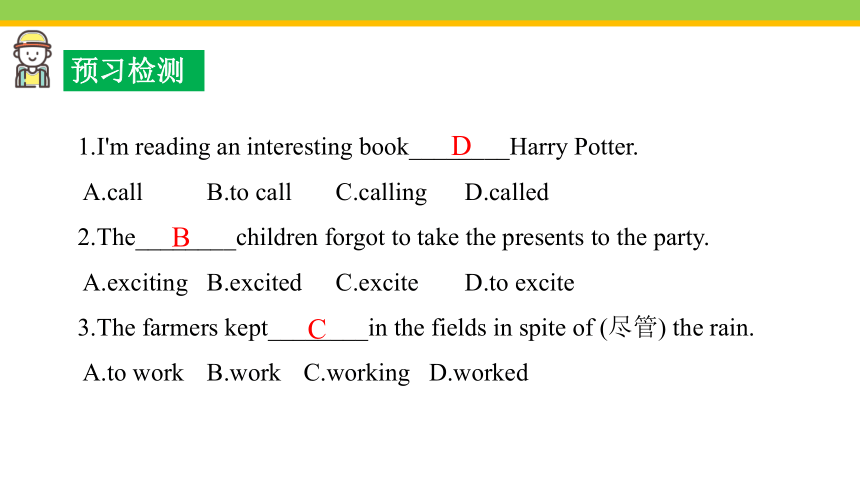
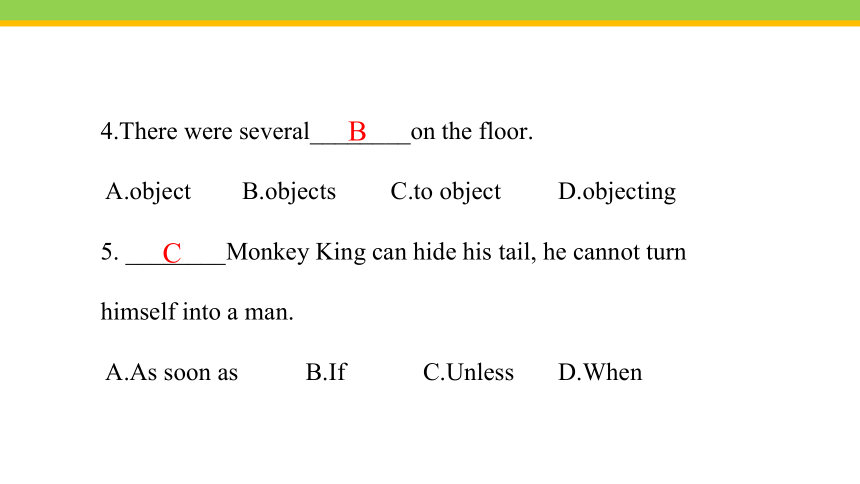
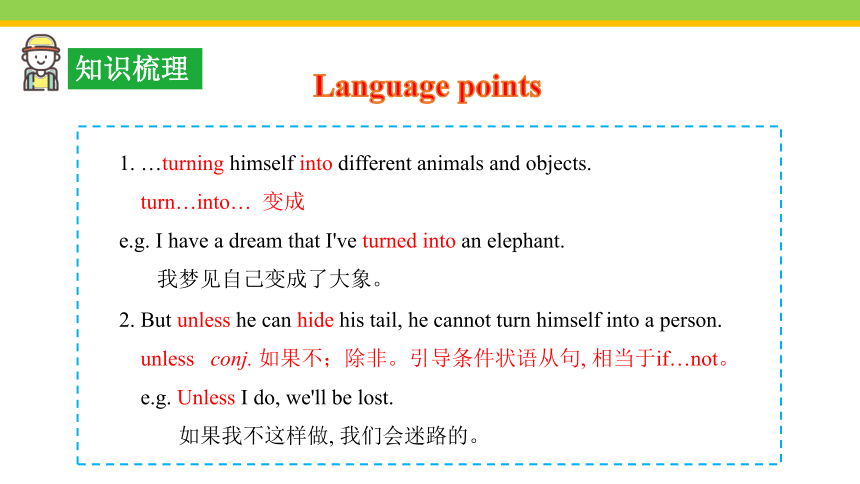
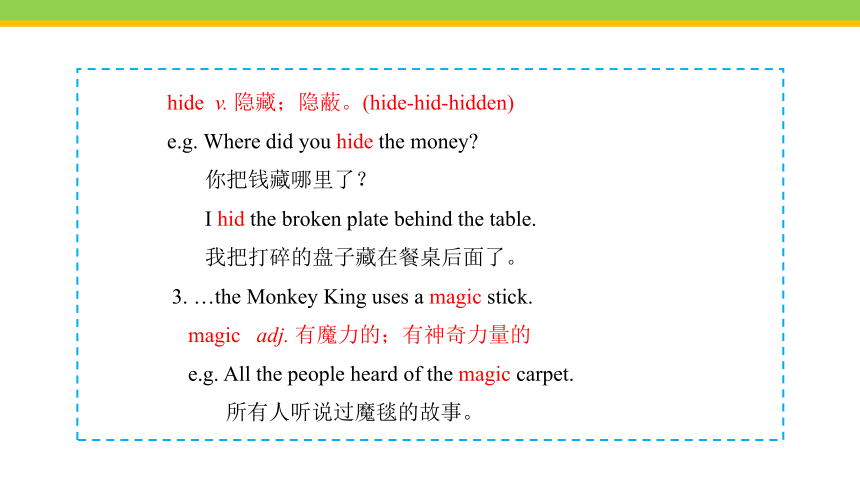
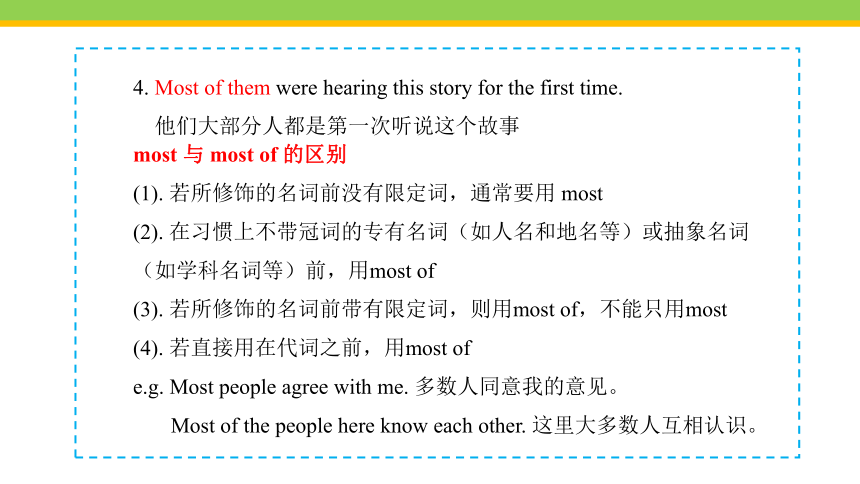
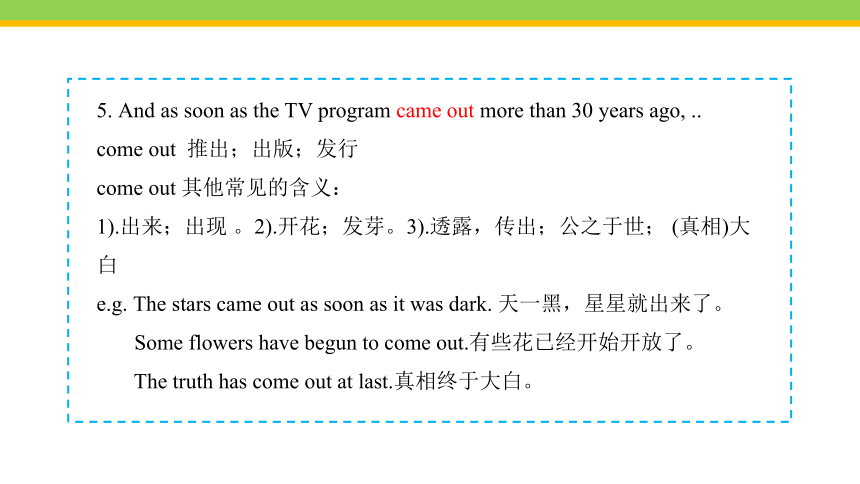
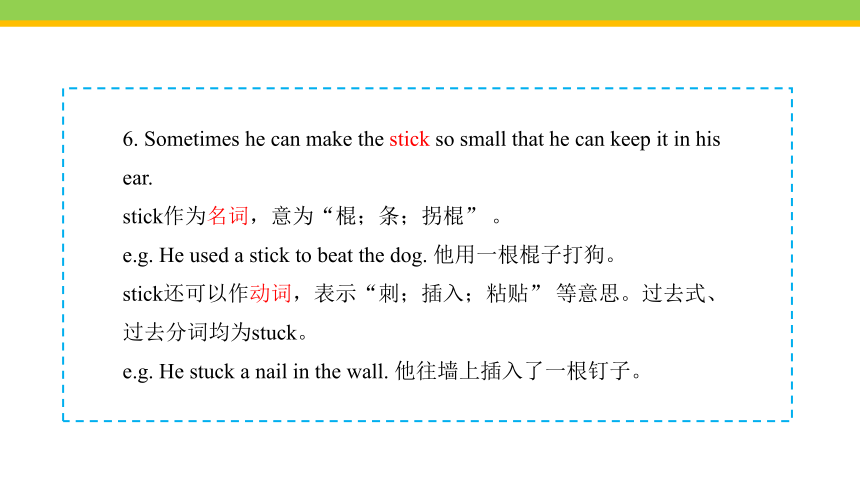
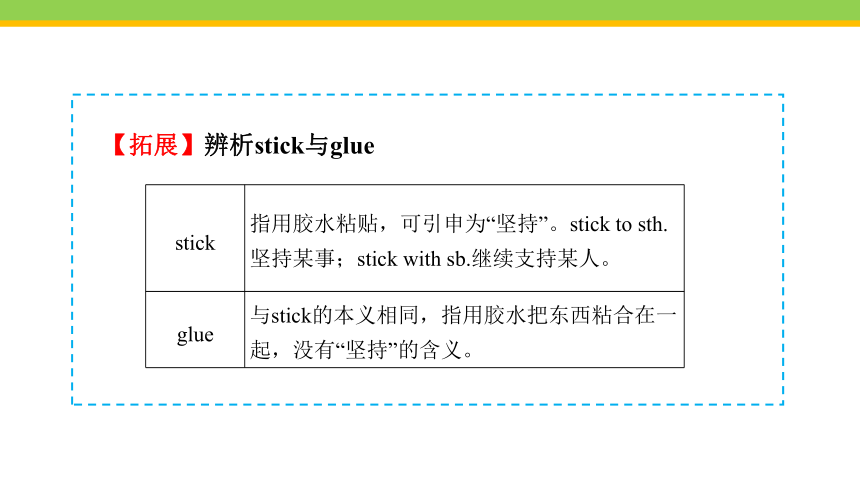
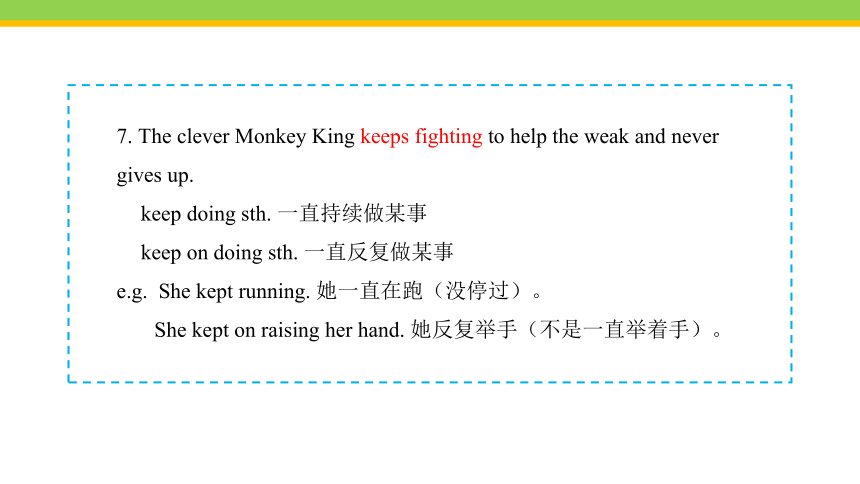
文档简介
(共30张PPT)
Unit 6
An old man tried to move the mountains.
Section A (3a~3c)
新课导入
Let's watch a video and be ready to discuss.
Do you know the name of this cartoon
Journey to the West
2
1
能熟悉并正确运用本课时的重点单词和短语
能通过阅读,了解Monkey King的故事。
预习检测
1.I'm reading an interesting book________Harry Potter.
A.call B.to call C.calling D.called
2.The________children forgot to take the presents to the party.
A.exciting B.excited C.excite D.to excite
3.The farmers kept________in the fields in spite of (尽管) the rain.
A.to work B.work C.working D.worked
D
B
C
4.There were several________on the floor.
A.object B.objects C.to object D.objecting
5. ________Monkey King can hide his tail, he cannot turn himself into a man.
A.As soon as B.If C.Unless D.When
B
C
知识梳理
Language points
2. But unless he can hide his tail, he cannot turn himself into a person.
unless conj. 如果不;除非。引导条件状语从句, 相当于if…not。
e.g. Unless I do, we'll be lost.
如果我不这样做, 我们会迷路的。
1. …turning himself into different animals and objects.
turn…into… 变成
e.g. I have a dream that I've turned into an elephant.
我梦见自己变成了大象。
3. …the Monkey King uses a magic stick.
magic adj. 有魔力的;有神奇力量的
e.g. All the people heard of the magic carpet.
所有人听说过魔毯的故事。
hide v. 隐藏;隐蔽。(hide-hid-hidden)
e.g. Where did you hide the money
你把钱藏哪里了?
I hid the broken plate behind the table.
我把打碎的盘子藏在餐桌后面了。
most 与 most of 的区别
(1). 若所修饰的名词前没有限定词,通常要用 most
(2). 在习惯上不带冠词的专有名词(如人名和地名等)或抽象名词
(如学科名词等)前,用most of
(3). 若所修饰的名词前带有限定词,则用most of,不能只用most
(4). 若直接用在代词之前,用most of
e.g. Most people agree with me. 多数人同意我的意见。
Most of the people here know each other. 这里大多数人互相认识。
4. Most of them were hearing this story for the first time.
他们大部分人都是第一次听说这个故事
5. And as soon as the TV program came out more than 30 years ago, ..
come out 推出;出版;发行
come out 其他常见的含义:
1).出来;出现 。2).开花;发芽。3).透露,传出;公之于世; (真相)大白
e.g. The stars came out as soon as it was dark. 天一黑,星星就出来了。
Some flowers have begun to come out.有些花已经开始开放了。
The truth has come out at last.真相终于大白。
6. Sometimes he can make the stick so small that he can keep it in his ear.
stick作为名词,意为“棍;条;拐棍” 。
e.g. He used a stick to beat the dog. 他用一根棍子打狗。
stick还可以作动词,表示“刺;插入;粘贴” 等意思。过去式、过去分词均为stuck。
e.g. He stuck a nail in the wall. 他往墙上插入了一根钉子。
【拓展】辨析stick与glue
stick 指用胶水粘贴,可引申为“坚持”。stick to sth.坚持某事;stick with sb.继续支持某人。
glue 与stick的本义相同,指用胶水把东西粘合在一起,没有“坚持”的含义。
7. The clever Monkey King keeps fighting to help the weak and never gives up.
keep doing sth. 一直持续做某事
keep on doing sth. 一直反复做某事
e.g. She kept running. 她一直在跑(没停过)。
She kept on raising her hand. 她反复举手(不是一直举着手)。
8. To fight bad people, the Monkey King uses a magic stick.
to fight: 动词不定式, 作目的状语,“为了……”
e.g. To draw maps properly, I need a special pen.
为了把地图画清楚,我需要一支特殊的笔。
He turned his head around to look at people.
他扭头看人。
9. In November 1979, pupils in England were able to watch a TV program called Monkey.
1) be able to 能够,有能力。相当于情态动词can。后跟动词的原形。
e.g. I can clean up the living room. Are you able to do the dishes
我可以打扫卧室,你能洗碗吗?
2) called 叫做,命名。相当于named,在文中作TV program的后置定语。
e.g. I don't know which is the boy called / named Tom.
我不知道哪个男孩叫汤姆。
11. Sometimes he can make the stick so small that he can keep it in his ear.
so …that… 如此……以至于…… 引导结果状语从句
句型为: 主语 + 谓语 + so +形容词/副词 + that从句
e.g. The book is so interesting that most kids become interested in it.
这本书如此有趣以至于大部分的孩子都对它感兴趣。
10. But unless he can hide his tail, he can't turn himself into a person.
unless: 连词, 意为除非, 如果不,相当于if not。引导条件状语从句, 主从句在时态上遵循主将从现的原则。
e.g. Unless it rains ( rain ) tomorrow, we will go fishing.
如果明天不下雨,我们就去钓鱼。
12. As soon as the TV program came out more than 30 years ago, Western children became interested in reading this story.
As soon as 意为:一……就…… ,引导时间状语从句。当主句是一般过去时的时候,从句用也用一般过去时;当主句是一般将来时的时候,从句用一般现在时表示将来,即主将从现。
e.g. As soon as Tom saw (see) the cat, he fell in love with it.
汤姆一看见那只猫,就爱上了它。
重点探究
略读文章,回答问题
Brainstorm
What do you know about him
Sun Wukong, also known as the Monkey King, is a main character in the Chinese classical novel Journey to the West.
Journey to the West (Chinese: 西游记) is a Chinese novel published in the 16th century during the Ming Dynasty and attributed by Wu Cheng'en. It is one of the Four Great Classical Novels of Chinese literature.
Tang Sanzang
Zhu Bajie
Sha Wujing
the Monkey King
Main Character(主要人物)
He can change his shape and size and turn himself into different animals and objects.
He can make 72 changes to his shape and size.
a magic stick
Sometimes he can make the stick so small that he can keep it in his ear.
3a. Read the passage and answer the questions.
1. Which book is talked about
2. Who is the main character
3. What is he like
Journey to the West.
The Monkey King, Sun Wukong.
He is not just any normal monkey. In fact, he sometimes does not even look like a monkey!
3b. Read the passage again and complete the chart about the Monkey King.
What he can do What he cannot do
make 72 changes to his shape and size, turning himself into different animals and objects
make his magic stick so small that he can keep it in his ear, or make his magic stick big and long.
turn himself into a man (unless he can hide his tail)
3c. Complete the sentences below with phrases from the passage.
1. Journey to the West is a __________ Chinese book. It tells one of the most popular stories in China.
2. When the English TV program Monkey ________ in 1979, Western children _________________ this wonderful story.
3. The Monkey King can ______________ to his body. He is able to _______________ different animals and objects.
4. The Monkey King ________ make his magic stick small or large.
traditional
came out
became interested in
is able to
make 72 changes
turn himself into
活动小结
当堂检测见DCF课件
通过以上活动,我们知道:Monkey King是中国四大古典名著之一1._________________中的主角。他拥有2._______般变化,它使用3.____________一路降妖除魔。
Journey to the West
72
magic stick
重点单词和短语
认真阅读课文,找出以下重点单词和短语object, tail, magic, Western, be able to,turn...into, become interested in, come out, as soon as
运用所找出的单词或短语,尝试造句。
易错辨析:exciting / excited / excite
(1) exciting 作形容词,意为“令人兴奋的;使人激动的”,主语是物或事。
e.g. This movie is so exciting.这部电影真让人兴奋、激动。
(2) excited 作形容词,意为“兴奋的;激昂的”,主语为人。
e.g. She's so excited about the coming holiday.
对于即将来到的假日,她兴奋不已。
(3) excite 作动词,意为“使兴奋”。
e.g. The odd noises excited our curiosity.
古怪的噪音激起了我们的好奇心。
辨析be able to与can
be able to 意为“能;会”,表示经过努力并达到目的,可用于各种时态。例如:
(1)We will be able to come back next week. 我们下周能回来。
(2)The boy was able to ride a bike when he was six years old.
这个男孩六岁时会骑自行车。
(3)She has been able to swim. 她已经会游泳了。
【比较】can 也可表示“能”,只有原形和过去式两种形式,即can 和could。当be able to 与can表示现在和过去的能力时,两者可互换。例如:
(1)I can swim. = I am able to swim. 我会游泳。
(2)No one could answer the question. = No one was able to answer the question.
没有人能回答这个问题。
活动小结
当堂检测见DCF课件
通过以上的活动,我们学习了:exciting / excited / excite 的用法。
exciting 作形容词,意为“令人兴奋的;使人激动的”,主语可以是1.__________。
excited 作形容词,意为“兴奋的;激昂的”,主语是 2.__________。
excite 作动词,意为“使兴奋”。
物
人
一、用方框中单词的适当形式填空。
当堂检测
magic, birth, hide, tail, turn…into, western
1. Four years later, Laura gave _________ to a son.
2. They want to _________ the old houses into a hotel.
3. England lies to the _________ part of Europe.
4. She broke her _________ mirror into pieces.
5. Dogs wave their _________ when they're pleased.
6. Don't _________ behind the door. It's not safe.
turn
birth
western
magic
tails
hide
课堂总结
Unit 6
Section A (3a~3c)
重点单词及短语:
_____________________________________
_____________________________________
_____________________________________
object
hide
tail
magic
stick
excite
western
turn...into
Monkey King的故事:
Monkey King是中国四大古典名著之一1._________________中的主角。他拥有2._______般变化,它使用3.___________ 一路降妖除魔
Journey to the West
72
magic stick
Unit 6
An old man tried to move the mountains.
Section A (3a~3c)
新课导入
Let's watch a video and be ready to discuss.
Do you know the name of this cartoon
Journey to the West
2
1
能熟悉并正确运用本课时的重点单词和短语
能通过阅读,了解Monkey King的故事。
预习检测
1.I'm reading an interesting book________Harry Potter.
A.call B.to call C.calling D.called
2.The________children forgot to take the presents to the party.
A.exciting B.excited C.excite D.to excite
3.The farmers kept________in the fields in spite of (尽管) the rain.
A.to work B.work C.working D.worked
D
B
C
4.There were several________on the floor.
A.object B.objects C.to object D.objecting
5. ________Monkey King can hide his tail, he cannot turn himself into a man.
A.As soon as B.If C.Unless D.When
B
C
知识梳理
Language points
2. But unless he can hide his tail, he cannot turn himself into a person.
unless conj. 如果不;除非。引导条件状语从句, 相当于if…not。
e.g. Unless I do, we'll be lost.
如果我不这样做, 我们会迷路的。
1. …turning himself into different animals and objects.
turn…into… 变成
e.g. I have a dream that I've turned into an elephant.
我梦见自己变成了大象。
3. …the Monkey King uses a magic stick.
magic adj. 有魔力的;有神奇力量的
e.g. All the people heard of the magic carpet.
所有人听说过魔毯的故事。
hide v. 隐藏;隐蔽。(hide-hid-hidden)
e.g. Where did you hide the money
你把钱藏哪里了?
I hid the broken plate behind the table.
我把打碎的盘子藏在餐桌后面了。
most 与 most of 的区别
(1). 若所修饰的名词前没有限定词,通常要用 most
(2). 在习惯上不带冠词的专有名词(如人名和地名等)或抽象名词
(如学科名词等)前,用most of
(3). 若所修饰的名词前带有限定词,则用most of,不能只用most
(4). 若直接用在代词之前,用most of
e.g. Most people agree with me. 多数人同意我的意见。
Most of the people here know each other. 这里大多数人互相认识。
4. Most of them were hearing this story for the first time.
他们大部分人都是第一次听说这个故事
5. And as soon as the TV program came out more than 30 years ago, ..
come out 推出;出版;发行
come out 其他常见的含义:
1).出来;出现 。2).开花;发芽。3).透露,传出;公之于世; (真相)大白
e.g. The stars came out as soon as it was dark. 天一黑,星星就出来了。
Some flowers have begun to come out.有些花已经开始开放了。
The truth has come out at last.真相终于大白。
6. Sometimes he can make the stick so small that he can keep it in his ear.
stick作为名词,意为“棍;条;拐棍” 。
e.g. He used a stick to beat the dog. 他用一根棍子打狗。
stick还可以作动词,表示“刺;插入;粘贴” 等意思。过去式、过去分词均为stuck。
e.g. He stuck a nail in the wall. 他往墙上插入了一根钉子。
【拓展】辨析stick与glue
stick 指用胶水粘贴,可引申为“坚持”。stick to sth.坚持某事;stick with sb.继续支持某人。
glue 与stick的本义相同,指用胶水把东西粘合在一起,没有“坚持”的含义。
7. The clever Monkey King keeps fighting to help the weak and never gives up.
keep doing sth. 一直持续做某事
keep on doing sth. 一直反复做某事
e.g. She kept running. 她一直在跑(没停过)。
She kept on raising her hand. 她反复举手(不是一直举着手)。
8. To fight bad people, the Monkey King uses a magic stick.
to fight: 动词不定式, 作目的状语,“为了……”
e.g. To draw maps properly, I need a special pen.
为了把地图画清楚,我需要一支特殊的笔。
He turned his head around to look at people.
他扭头看人。
9. In November 1979, pupils in England were able to watch a TV program called Monkey.
1) be able to 能够,有能力。相当于情态动词can。后跟动词的原形。
e.g. I can clean up the living room. Are you able to do the dishes
我可以打扫卧室,你能洗碗吗?
2) called 叫做,命名。相当于named,在文中作TV program的后置定语。
e.g. I don't know which is the boy called / named Tom.
我不知道哪个男孩叫汤姆。
11. Sometimes he can make the stick so small that he can keep it in his ear.
so …that… 如此……以至于…… 引导结果状语从句
句型为: 主语 + 谓语 + so +形容词/副词 + that从句
e.g. The book is so interesting that most kids become interested in it.
这本书如此有趣以至于大部分的孩子都对它感兴趣。
10. But unless he can hide his tail, he can't turn himself into a person.
unless: 连词, 意为除非, 如果不,相当于if not。引导条件状语从句, 主从句在时态上遵循主将从现的原则。
e.g. Unless it rains ( rain ) tomorrow, we will go fishing.
如果明天不下雨,我们就去钓鱼。
12. As soon as the TV program came out more than 30 years ago, Western children became interested in reading this story.
As soon as 意为:一……就…… ,引导时间状语从句。当主句是一般过去时的时候,从句用也用一般过去时;当主句是一般将来时的时候,从句用一般现在时表示将来,即主将从现。
e.g. As soon as Tom saw (see) the cat, he fell in love with it.
汤姆一看见那只猫,就爱上了它。
重点探究
略读文章,回答问题
Brainstorm
What do you know about him
Sun Wukong, also known as the Monkey King, is a main character in the Chinese classical novel Journey to the West.
Journey to the West (Chinese: 西游记) is a Chinese novel published in the 16th century during the Ming Dynasty and attributed by Wu Cheng'en. It is one of the Four Great Classical Novels of Chinese literature.
Tang Sanzang
Zhu Bajie
Sha Wujing
the Monkey King
Main Character(主要人物)
He can change his shape and size and turn himself into different animals and objects.
He can make 72 changes to his shape and size.
a magic stick
Sometimes he can make the stick so small that he can keep it in his ear.
3a. Read the passage and answer the questions.
1. Which book is talked about
2. Who is the main character
3. What is he like
Journey to the West.
The Monkey King, Sun Wukong.
He is not just any normal monkey. In fact, he sometimes does not even look like a monkey!
3b. Read the passage again and complete the chart about the Monkey King.
What he can do What he cannot do
make 72 changes to his shape and size, turning himself into different animals and objects
make his magic stick so small that he can keep it in his ear, or make his magic stick big and long.
turn himself into a man (unless he can hide his tail)
3c. Complete the sentences below with phrases from the passage.
1. Journey to the West is a __________ Chinese book. It tells one of the most popular stories in China.
2. When the English TV program Monkey ________ in 1979, Western children _________________ this wonderful story.
3. The Monkey King can ______________ to his body. He is able to _______________ different animals and objects.
4. The Monkey King ________ make his magic stick small or large.
traditional
came out
became interested in
is able to
make 72 changes
turn himself into
活动小结
当堂检测见DCF课件
通过以上活动,我们知道:Monkey King是中国四大古典名著之一1._________________中的主角。他拥有2._______般变化,它使用3.____________一路降妖除魔。
Journey to the West
72
magic stick
重点单词和短语
认真阅读课文,找出以下重点单词和短语object, tail, magic, Western, be able to,turn...into, become interested in, come out, as soon as
运用所找出的单词或短语,尝试造句。
易错辨析:exciting / excited / excite
(1) exciting 作形容词,意为“令人兴奋的;使人激动的”,主语是物或事。
e.g. This movie is so exciting.这部电影真让人兴奋、激动。
(2) excited 作形容词,意为“兴奋的;激昂的”,主语为人。
e.g. She's so excited about the coming holiday.
对于即将来到的假日,她兴奋不已。
(3) excite 作动词,意为“使兴奋”。
e.g. The odd noises excited our curiosity.
古怪的噪音激起了我们的好奇心。
辨析be able to与can
be able to 意为“能;会”,表示经过努力并达到目的,可用于各种时态。例如:
(1)We will be able to come back next week. 我们下周能回来。
(2)The boy was able to ride a bike when he was six years old.
这个男孩六岁时会骑自行车。
(3)She has been able to swim. 她已经会游泳了。
【比较】can 也可表示“能”,只有原形和过去式两种形式,即can 和could。当be able to 与can表示现在和过去的能力时,两者可互换。例如:
(1)I can swim. = I am able to swim. 我会游泳。
(2)No one could answer the question. = No one was able to answer the question.
没有人能回答这个问题。
活动小结
当堂检测见DCF课件
通过以上的活动,我们学习了:exciting / excited / excite 的用法。
exciting 作形容词,意为“令人兴奋的;使人激动的”,主语可以是1.__________。
excited 作形容词,意为“兴奋的;激昂的”,主语是 2.__________。
excite 作动词,意为“使兴奋”。
物
人
一、用方框中单词的适当形式填空。
当堂检测
magic, birth, hide, tail, turn…into, western
1. Four years later, Laura gave _________ to a son.
2. They want to _________ the old houses into a hotel.
3. England lies to the _________ part of Europe.
4. She broke her _________ mirror into pieces.
5. Dogs wave their _________ when they're pleased.
6. Don't _________ behind the door. It's not safe.
turn
birth
western
magic
tails
hide
课堂总结
Unit 6
Section A (3a~3c)
重点单词及短语:
_____________________________________
_____________________________________
_____________________________________
object
hide
tail
magic
stick
excite
western
turn...into
Monkey King的故事:
Monkey King是中国四大古典名著之一1._________________中的主角。他拥有2._______般变化,它使用3.___________ 一路降妖除魔
Journey to the West
72
magic stick
同课章节目录
- Unit 1 What's the matter?
- Section A
- Section B
- Unit 2 I'll help to clean up the city parks.
- Section A
- Section B
- Unit 3 Could you please clean your room?
- Section A
- Section B
- Unit 4 Why don't you talk to your parents?
- Section A
- Section B
- Unit 5 What were you doing when the rainstorm came
- Section A
- Section B
- Review of Units 1-5
- Unit 6 An old man tried to move the mountains.
- Section A
- Section B
- Unit 7 What's the highest mountain in the world?
- Section A
- Section B
- Unit 8 Have you read Treasure Island yet?
- Section A
- Section B
- Unit 9 Have you ever been to a museum?
- Section A
- Section B
- Unit 10 I've had this bike for three years.
- Section A
- Section B
